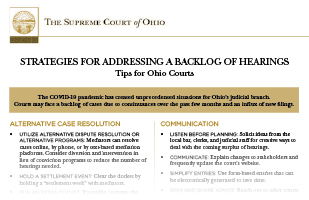New Benchcards Guide Hearing Backlogs

The Ohio Supreme Court has issued two new benchcards that will give judges guidance on dealing with hearing backlogs as a result of the health crisis.

The Ohio Supreme Court has issued two new benchcards that will give judges guidance on dealing with hearing backlogs as a result of the health crisis.
In the midst of the global pandemic, the Ohio Supreme Court has issued two benchcards that will give judges guidance on dealing with hearing backlogs.
The disruption caused by the health crisis required numerous case continuances since a national emergency was declared March 13.
The Pathway Approach Benchcard and Strategies for Addressing a Backlog of Hearings Benchcard were created to inform Ohio judges and staffers about procedures and ways to improve efficiency.
By increasing the efficiency of dockets through proportionally assigned resources, courts will be able to handle an increased volume of cases and resolve their backlogs.
The Pathway Approach Benchcard already has been put to use in Fayette County Domestic Relations Court by Judge Steven Beathard.
“Especially during this COVID pandemic, we need to work smarter and not harder,” said Carmen Baird, Fayette County Common Pleas Court administrator.
“We have been successfully managing our cases for some time and it really helps keep our caseload current,” she said. “The benchcard has a lot of good information that will help courts struggling to stay ahead and current during these uncertain times.”
The benchcards were created by the Court’s COVID-19 Backlog Workgroup to the Advisory Committee on Case Management, a group of judges, magistrates, attorneys and mediators who met in May to discuss potential solutions to growing backlogs.
The Pathway Approach stems from the recommendations of the Conference of Chief Justices’ Civil Justice Improvements Committee (CJI Committee) focused on achieving "right-sized" case management.
The National Center for State Court (NCSC) developed a Civil Justice Initiative for automating triage in civil case processing.
Another case management tool to assist courts is the NCSC’s Family Justice Initiative which featured Cuyahoga County Domestic Relations Court as a demonstration site. The court’s strengths included staffing and services, experienced family court leadership and user-centered case management practices.
Acrobat Reader is a trademark of Adobe Systems Incorporated.


